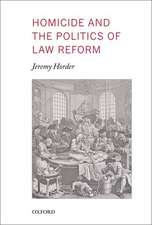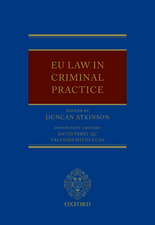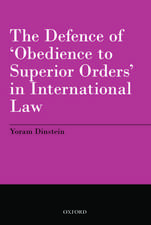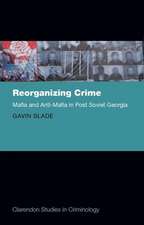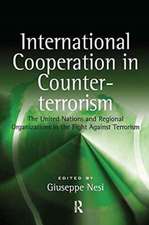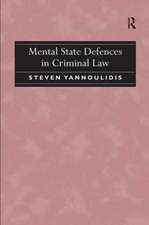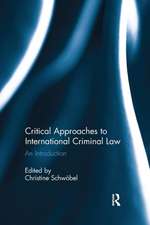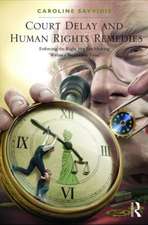Universal Jurisdiction in International Criminal Law: The Debate and the Battle for Hegemony: Routledge Research in International Law
Autor Aisling O'Sullivanen Limba Engleză Hardback – 14 feb 2017
This book explores the debate over universal jurisdiction in international criminal law, aiming to unpack a practice in which international lawyers continue to disagree over the concept of universal jurisdiction. Using Martti Koskenniemi’s work as a foil, this book exposes the argumentative techniques in operation in national and international adjudication since the 1990s. Drawing on overarching patterns within the debate, Aisling O’Sullivan argues that it is bounded by a tension between contrasting political preferences or positions, labelled as moralist ("ending impunity") and formalist ("avoiding abuse") and she reads the debate as a movement of hegemonic and counter-hegemonic positions that struggle for hegemonic control. However, she draws out how these positions (moralist/formalist) merge into one another and this produces a tendency towards a "middle" position that continues to prefer a particular preference (moralist or formalist). Aisling O’Sullivan then traces the transformation towards this tendency that reflects an internal split among international lawyers between building a utopia ("court of humanity") and recognizing its impossibility of being realized.
| Toate formatele și edițiile | Preț | Express |
|---|---|---|
| Paperback (1) | 302.59 lei 6-8 săpt. | |
| Taylor & Francis – 18 oct 2018 | 302.59 lei 6-8 săpt. | |
| Hardback (1) | 1054.71 lei 6-8 săpt. | |
| Taylor & Francis – 14 feb 2017 | 1054.71 lei 6-8 săpt. |
Din seria Routledge Research in International Law
-
 Preț: 326.36 lei
Preț: 326.36 lei -
 Preț: 311.94 lei
Preț: 311.94 lei -
 Preț: 311.70 lei
Preț: 311.70 lei -
 Preț: 296.42 lei
Preț: 296.42 lei -
 Preț: 151.71 lei
Preț: 151.71 lei - 9%
 Preț: 936.43 lei
Preț: 936.43 lei -
 Preț: 281.27 lei
Preț: 281.27 lei - 18%
 Preț: 1053.16 lei
Preț: 1053.16 lei -
 Preț: 485.40 lei
Preț: 485.40 lei -
 Preț: 282.62 lei
Preț: 282.62 lei - 18%
 Preț: 1059.45 lei
Preț: 1059.45 lei -
 Preț: 410.46 lei
Preț: 410.46 lei - 18%
 Preț: 729.62 lei
Preț: 729.62 lei - 18%
 Preț: 1054.71 lei
Preț: 1054.71 lei -
 Preț: 419.11 lei
Preț: 419.11 lei - 18%
 Preț: 1057.89 lei
Preț: 1057.89 lei - 18%
 Preț: 1074.44 lei
Preț: 1074.44 lei - 18%
 Preț: 1060.52 lei
Preț: 1060.52 lei - 18%
 Preț: 1058.43 lei
Preț: 1058.43 lei -
 Preț: 452.27 lei
Preț: 452.27 lei -
 Preț: 451.41 lei
Preț: 451.41 lei -
 Preț: 419.11 lei
Preț: 419.11 lei - 26%
 Preț: 822.34 lei
Preț: 822.34 lei - 18%
 Preț: 1118.46 lei
Preț: 1118.46 lei -
 Preț: 498.48 lei
Preț: 498.48 lei -
 Preț: 490.25 lei
Preț: 490.25 lei - 18%
 Preț: 1178.15 lei
Preț: 1178.15 lei -
 Preț: 444.62 lei
Preț: 444.62 lei - 18%
 Preț: 1050.78 lei
Preț: 1050.78 lei -
 Preț: 454.22 lei
Preț: 454.22 lei - 12%
 Preț: 301.13 lei
Preț: 301.13 lei -
 Preț: 419.11 lei
Preț: 419.11 lei - 18%
 Preț: 1052.35 lei
Preț: 1052.35 lei - 18%
 Preț: 1111.87 lei
Preț: 1111.87 lei - 18%
 Preț: 1112.21 lei
Preț: 1112.21 lei - 15%
 Preț: 550.99 lei
Preț: 550.99 lei -
 Preț: 422.91 lei
Preț: 422.91 lei -
 Preț: 286.51 lei
Preț: 286.51 lei -
 Preț: 494.07 lei
Preț: 494.07 lei - 18%
 Preț: 1117.88 lei
Preț: 1117.88 lei
Preț: 1054.71 lei
Preț vechi: 1286.24 lei
-18% Nou
Puncte Express: 1582
Preț estimativ în valută:
201.91€ • 207.77$ • 170.20£
201.91€ • 207.77$ • 170.20£
Carte tipărită la comandă
Livrare economică 01-15 martie
Preluare comenzi: 021 569.72.76
Specificații
ISBN-13: 9781138123946
ISBN-10: 1138123943
Pagini: 234
Dimensiuni: 156 x 234 x 20 mm
Greutate: 0.45 kg
Ediția:1
Editura: Taylor & Francis
Colecția Routledge
Seria Routledge Research in International Law
Locul publicării:Oxford, United Kingdom
ISBN-10: 1138123943
Pagini: 234
Dimensiuni: 156 x 234 x 20 mm
Greutate: 0.45 kg
Ediția:1
Editura: Taylor & Francis
Colecția Routledge
Seria Routledge Research in International Law
Locul publicării:Oxford, United Kingdom
Public țintă
Postgraduate and UndergraduateCuprins
1. The Politics of International Law 2. Narratives of Justification from 1883 3. Conventional Readings 4. Competing for Hegemony 5. Returning to the Status Quo? 6. Conclusion
Descriere
This book explores the concept of universal jurisdiction in international criminal law through a critical international legal approach. Drawing on the work of Martti Koskenniemi and David Kennedy it unpacks the legal arguments justifying and criticizing universal jurisdiction in the legal debate on jurisdiction and through analysis of the relevant case law. Identifying overarching patterns within the debate on universal jurisdiction, the book argues that the debate is bounded by the tension between contrasting political approaches, labelled as moralist ("preventing impunity") and formalist ("avoiding abuse") which struggle for hegemonic control.


